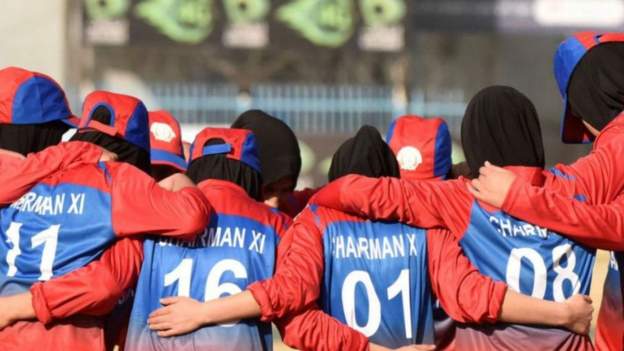Afghanistan Women's Cricket Team: In Limbo and in exile in Australia

"My teacher said you all had to go home. We all got up and I saw the Taliban on our way back. I was really, really scared,” she told the BBC. at home, Sapan grabbed her cricket kit and hid it in the basement. She was also the team's scorer, so she went to the garden and burned all her score books.
Sapan, whose brother worked for the previous government, says his family then started receiving calls and messages from Taliban.
"Those were direct threats. They said, “We will find you and if we find you, we won't let you live. If we find one of you, we'll find all of you," she said.
" I had a panic attack, my hands were shaking. I was so scared, I was traumatized. Every time I heard a knock on the door, all I could think was 'they found us, they're going to kill us.'"
Those who send her threats are now serving the government, she says.
Over the next few months, Sapan and her family moved from house to house to avoid detection. She eventually managed to escape across the border into Pakistan, before reuniting with the rest of her team in Australia.
They are now out of the clutches of the Taliban, but Sapan and his teammates are still waiting, their careers resting on the whims of others.

Afghanistan's first women's national team was formed in 2010, nine years after the fall of the Taliban to a US-led military coalition.
In the early years, the Afghanistan Cricket Board (ACB) barred the women's team from playing in several international tournaments, claiming to have received "Taliban threats".
But as the profile of the men's team grew, the ACB had to start...



"My teacher said you all had to go home. We all got up and I saw the Taliban on our way back. I was really, really scared,” she told the BBC. at home, Sapan grabbed her cricket kit and hid it in the basement. She was also the team's scorer, so she went to the garden and burned all her score books.
Sapan, whose brother worked for the previous government, says his family then started receiving calls and messages from Taliban.
"Those were direct threats. They said, “We will find you and if we find you, we won't let you live. If we find one of you, we'll find all of you," she said.
" I had a panic attack, my hands were shaking. I was so scared, I was traumatized. Every time I heard a knock on the door, all I could think was 'they found us, they're going to kill us.'"
Those who send her threats are now serving the government, she says.
Over the next few months, Sapan and her family moved from house to house to avoid detection. She eventually managed to escape across the border into Pakistan, before reuniting with the rest of her team in Australia.
They are now out of the clutches of the Taliban, but Sapan and his teammates are still waiting, their careers resting on the whims of others.

Afghanistan's first women's national team was formed in 2010, nine years after the fall of the Taliban to a US-led military coalition.
In the early years, the Afghanistan Cricket Board (ACB) barred the women's team from playing in several international tournaments, claiming to have received "Taliban threats".
But as the profile of the men's team grew, the ACB had to start...
What's Your Reaction?














![Three of ID's top PR executives quit ad firm Powerhouse [EXCLUSIVE]](https://variety.com/wp-content/uploads/2023/02/ID-PR-Logo.jpg?#)







